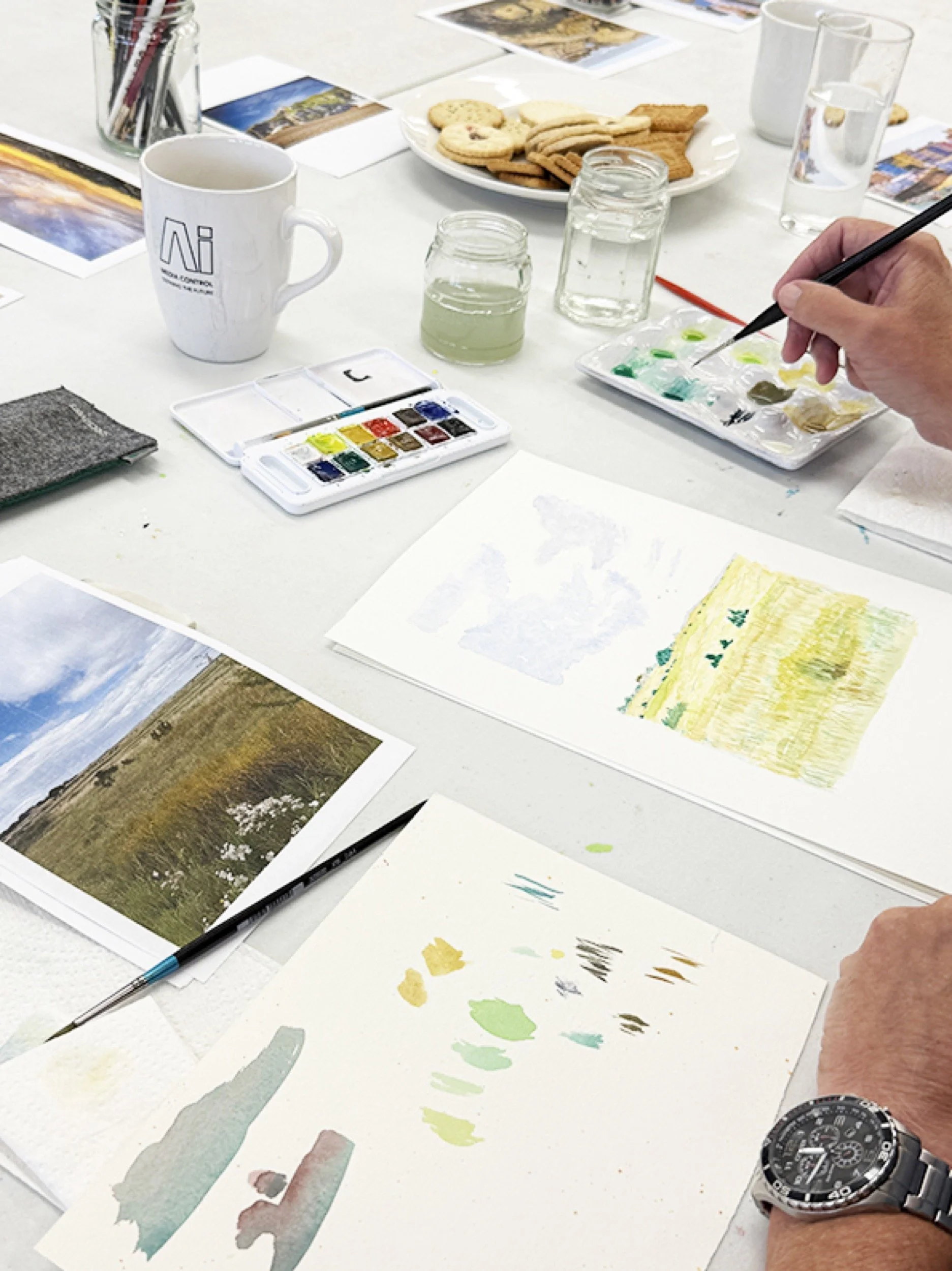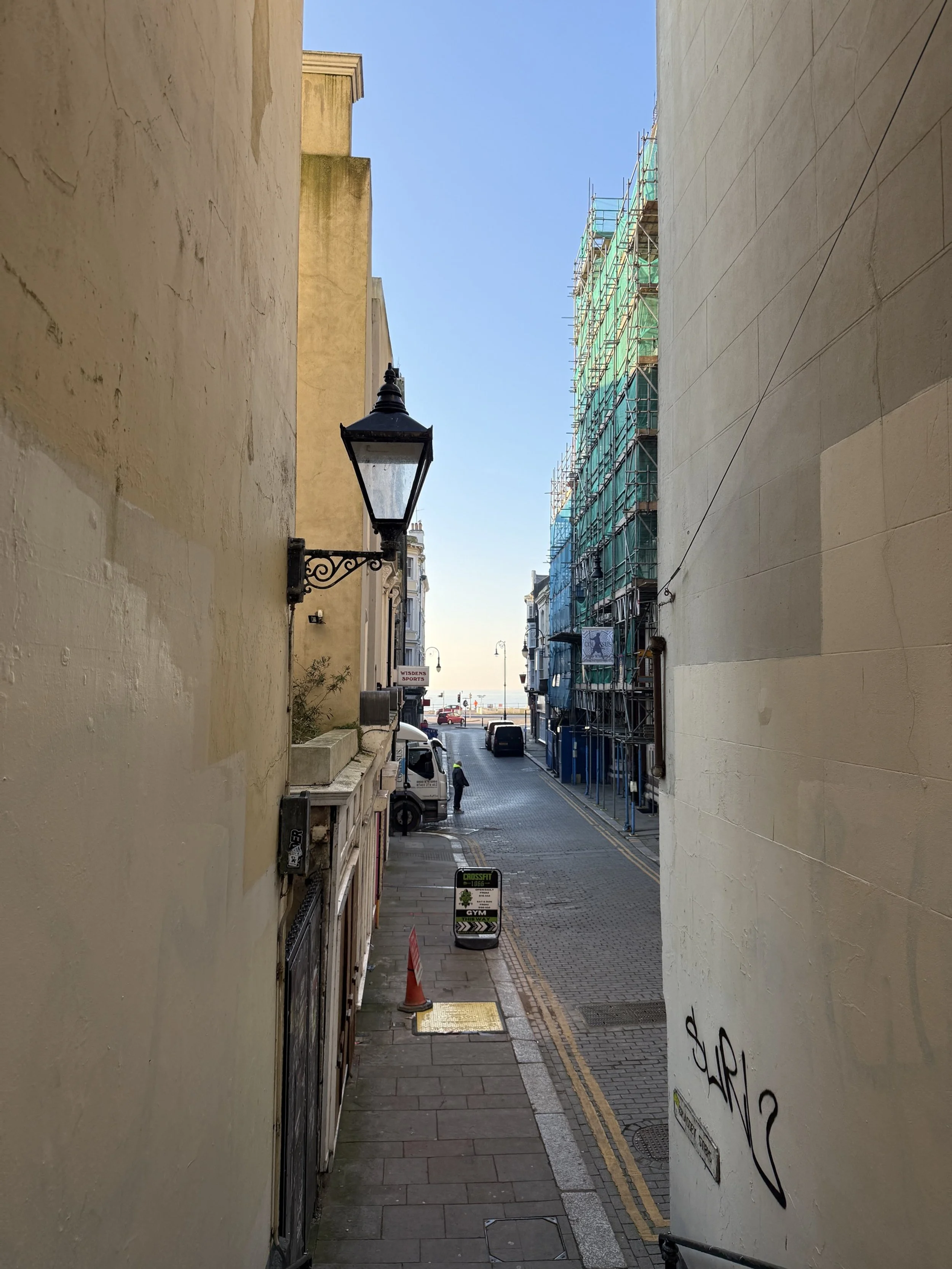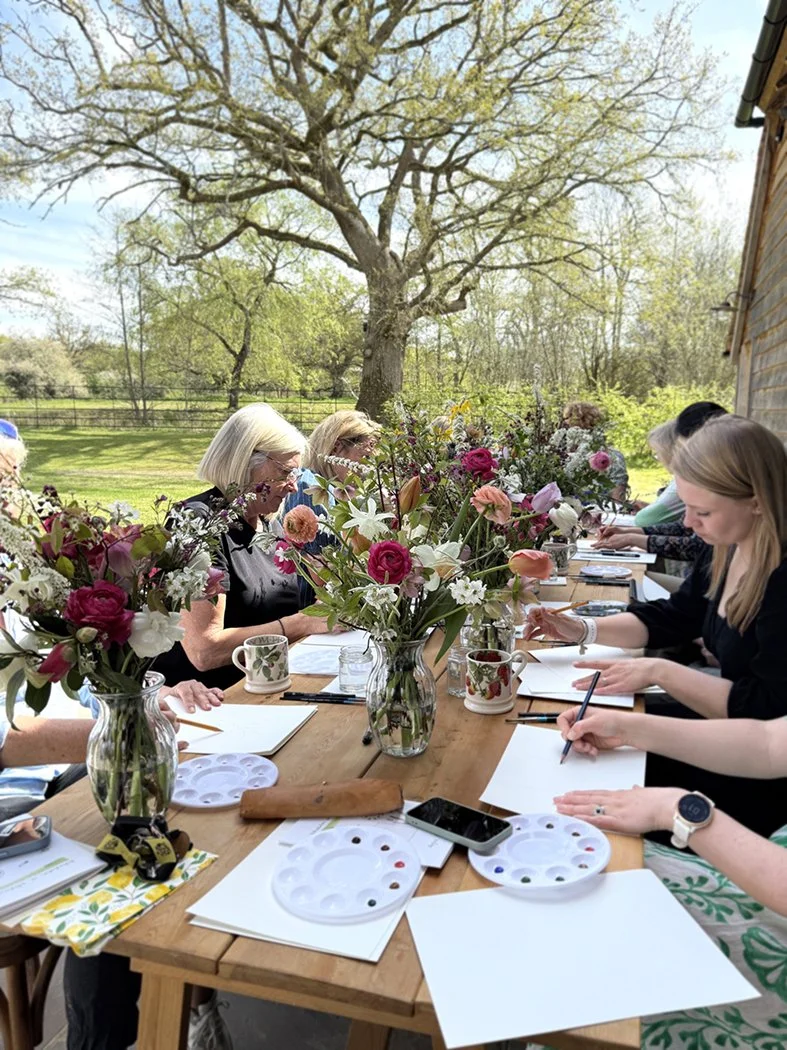Over the past six months, I’ve had the privilege of leading a series of weekly Building in Watercolour workshops for West Kent Mind, as part of their Creative Minds programme, funded by the National Lottery Community Fund.
The programme is for anyone, not just those who are struggling or have a diagnosis with their mental health. It aims to communicate the power of creativity for mental health and wellbeing, something I have personal experience with. Over the three years of funding it has included creative subjects like knitting, cooking, puppet making, creative writing, silk painting, even Dungeons and Dragons, and of course, watercolour painting.
I wanted to write about them because it’s important to share and hopefully inspire others to see how creativity can slot into so many different scenarios, from workplace, to charity to home life. It’s hard to put into words just how special these sessions have been, not just for the group, but for me too, but I hope this gives you a snapshot.
The First Steps
I remember our first session in April. I felt nervous walking into a new space, meeting a group of people I’d never met before. We talked about it with the group afterwards and I know Andy, our West Kent Mind wellbeing worker, felt the same. But that’s the important thing about these sessions, people actually came.
Signing up for something outside of your comfort zone is huge. Physically showing up, even when you don’t know what to expect, takes a lot of courage and I felt so proud of everyone that day for doing just that. Then for continuing to do so week in week out.
We talked and started to get to know each other, we did a little bit of painting, and by the end of the session, the room had settled and felt a lot more at ease. Several people described feeling relaxed and peaceful, which is exactly the point! That’s the feeling I know so well from painting myself, the calm and focus that helps the rest of the world go quiet for a little while.
The Power of Creative Space
As the weeks went by, I realised that these workshops are never just about painting. They’re about connection, conversation and calm.
We talked about perfectionism, that inner voice that tells us we have to get it exactly right before we start. We talked about how hard we can be on ourselves, how easily we dismiss our own creativity with “it’s not very good” while admiring everyone else’s.
These moments of reflection often happen quietly, sometimes absentmindedly, while painting, and they always remind me how much creativity isn’t about the outcome, it’s about the process. About relaxing into that process, learning to say ‘thank you’ when someone compliments your work, and noticing the good instead of fixating on the perceived flaws.
Connection and Conversation
What’s been especially powerful this time is that the group was made up entirely of men. I ran another West Kent Mind Creative Minds watercolour programme in 2024 which was open to anyone, but ended up being all women (MUST write about this one too).
One of the group asked me early on how it felt to run a men’s group versus a women’s group. Honestly, it’s been one of my favourite things to experience both. It felt like a privilege to see men talk so openly about their feelings, or simply sitting in a space where others do, listening or supporting each other.
For many, this kind of conversation is new. Generationally, lots of them (and lots of people in society now) grew up without seeing that modelled, especially by their fathers. But here, I was seeing that narrative being challenged and explored. Some shared more, others preferred to listen and it varied from week to week, both are equally valuable. The act of listening to others express what you’ve never said aloud can be healing in itself.
Each week, the feeling in the room was slightly different, but always positive, supportive and like a real team. Some weeks people had been struggling, some weeks people were quieter, others were particularly jolly, but it was always filled with a combination of conversation and quiet moments (and a lot of biscuit chat - they don’t call themselves the Jammy Dodgers for nothing).
I remember one week we ran over time a little, not because people refused to stop painting, but because nobody was leaving. They helped to pack up and were just standing chatting, when we went out into the car park, they carried on chatting there too. I looked at them and felt really proud to be witnessing this, that sense of connection and belonging is something that will stick with me.
The Importance of Men’s Groups
Something else that really stood out to me over the months was how important it was that this was a men’s group. There was a strong sense of safety and ease in that dynamic, something that felt really valuable. When we mentioned someone might join the group, they were curious to know if it would be another man or if it might be a woman, and it was clear that they appreciated the balance they already had together as men. I had wondered at the start whether me being female might shift the dynamic or compromise the value, but it didn’t seem to at all. Perhaps because I had a set role, or maybe because of my personality, or a mix of both. It seemed to just work.
Two of the group even mentioned in our final session that my being female hadn’t altered the sense of it being a men’s space. The structure, tone and trust we’d built meant it felt comfortable for everyone, and I found that both interesting and reassuring.
It also made me reflect on how few opportunities there seem to be for men to join creative or reflective spaces like this. I see far fewer men in my public workshops, and I know I’m not alone in that, many of my creative friends who run workshops have found the same. A couple of our group members said they’d only joined because someone encouraged (or even pushed) them to, and although a little reluctant to try it, they were so glad they did. It makes me think how many more people could benefit if they were simply given a gentle nudge to try something new.
I think there’s something powerful about seeing a group of men painting, talking (or not talking), laughing together and supporting each other. There’s still a perception that creativity is a “soft” or secondary skill, or reserved for only the highest elite, and that belief, rooted in old social expectations, still runs deep. Seeing that narrative being challenged and rewritten in front of me, through art, presence and community, felt like a privilege. I think these spaces matter more than we realise.
Stand Out Moments
It’s too hard to choose stand out moments, because there were so many over the months that stood out for me, some of them the very small seemingly mundane moments as much as any breakthroughs.
The man who came along and at first he didn’t paint, just listened, and said afterwards how much calmer he felt just being there.
The group member who used to be a musician said he loved painting because “it stays.” (I love this)
The person who said that driving home afterwards felt like “a warm glow all over.”
The man in the last session who said “I think I’ve found my thing”
And the final exhibition, seeing all their work together and how proud they were, having grown their confidence so much over the months.
Those comments are what this programme is all about. Yes, the paintings are wonderful, but it’s the consistently showing up each week, the slowing down that comes with painting, the sharing along the way and those small shifts in confidence that make the biggest impact.
Community, Creativity and Change
By the final few weeks, talk had turned to what’s next. Nobody wanted the sessions to end, and I understand that completely. When something has brought you that safe space of calm and connection, it’s hard to let go.
I also think that’s part of the power of this programme, it plants a seed. It reminds people what creativity feels like, so they can seek it out again, whether through a local class, painting at home or together, or simply meeting for coffee with someone they’ve met here. Understanding it is a tool at their fingertips to use in a way that works for them, and perhaps to look for creativity and that feeling in other ways too.
That ripple effect, the ongoing friendships, the new sense of self, the understanding that you can express and connect is what makes it so meaningful.
It can’t last forever because of the way the program is set up and the funding limits. However I think it would be less impactful if it was forever (as much as I would also like to just carry on). I think we need to bring this to as many people as possible, to spread that spark of creativity far and wide. To inspire people to start groups, find places, meet people, experience the peace and joy creativity can bring.
Reflections on the Programme
When I look back over the Creative Minds programme, the main successes are of course not just artistic, though the group’s progress with watercolour has been incredible. Most of the participants hadn’t painted since childhood (if at all), and yet they produced beautiful, confident work, each developing their own style and voice.
However (not to diminish anyone's artistic talents at all) that feels to me like the smaller success compared to what happened between them as people. They became genuine friends, showing up not just for the painting, but for each other. They learned to trust the space and one another, opening up more each week and finding safety in shared experience. Watching their confidence grow, both personally and creatively, has been one of the most rewarding parts of the whole experience.
I feel like the outcomes far surpassed what I originally imagined, which is a wonderful note to have ended on.
Collaboration and Learning
Working alongside Andy at West Kent Mind was an absolute pleasure. We made a great team, each with our own roles, sharing the space, adapting together, and supporting one another through the weeks. Every session brought a sense of joy and purpose.
On a personal level, this experience has deepened my understanding of what creative practice can offer. It has reminded me how accessible these tools really are, drawing and painting are simple, human acts that anyone can do, regardless of experience and yet, their impact can be profound.
I’ve also learned so much about the power of presence, of listening, and of creating environments where people feel safe to express themselves. Facilitating a men’s group has shown me how creativity can open conversations that might otherwise stay hidden and how valuable it is to witness that vulnerability.









Final Reflections
Something that really stuck me throughout this course is how much of people’s lives are shaped by their early experiences. The impact of parents, teachers, peers, and the messages we absorb about ourselves when we’re young. It made me reflect on how those patterns stay with us, how many people have carried the effects of misunderstanding or lack of empathy from decades ago, and how that can shape their self-esteem, confidence or creativity for a lifetime.
However it also gave me hope. We are living in a time of change, where there is more awareness, compassion and understanding around mental health and individual differences. Programmes like this and the work of charities like West Kent Mind are a vital part of that shift.
It is incredibly sad to think of how many people have carried those old wounds alone, but I’m so grateful that spaces like this exist. That I get to be part of the change, helping people experience what conversation, creativity and community can do.
These sessions are not the answer to everyone's problems, they will not solve everything, but they can and they do really make a difference. I hope there are opportunities to continue to reach more people in the future.
It’s been a real privilege to be part of this and I will be forever grateful for the experience.
Thank you to West Kent Mind, to Andy, and the National Lottery Community Fund for making it possible, and of course to the brilliant men who showed up, trusted, shared, and painted their way through six transformative months together.
Award Winning Programme
An update after initially writing this blog - I am delighted to share that the West Kent Mind Creative Minds programme has won the regional Charity Service Delivery Award AND the overall Kent Wellbeing Service Delivery Champion at the Kent Mental Wellbeing Awards 2025.
The awards said “Creative Minds, delivered by West Kent Mind, is transforming lives through creativity, offering art, writing, photography and even Dungeons & Dragons as tools for wellbeing. The programme helps people rebuild confidence, reduce isolation and find purpose, with 66% of participants reporting measurable improvements in mental health.
This year the charity has delivered 380 workshops to 213 people on sessions as varied as silk painting, photography, creative writing and even Dungeons & Dragons. Through its innovative peer-led model, trained “Creative Agents” now co-facilitate sessions and inspire others - creating a powerful ripple effect of hope, connection and recovery across the community.”
I hope this recognition shines a light on the wonderful work of everyone involved with the Creative Minds program, the importance of creativity for mental health and wellbeing, and hopefully boosts future funding opportunities to bring this to many more people who need it.













